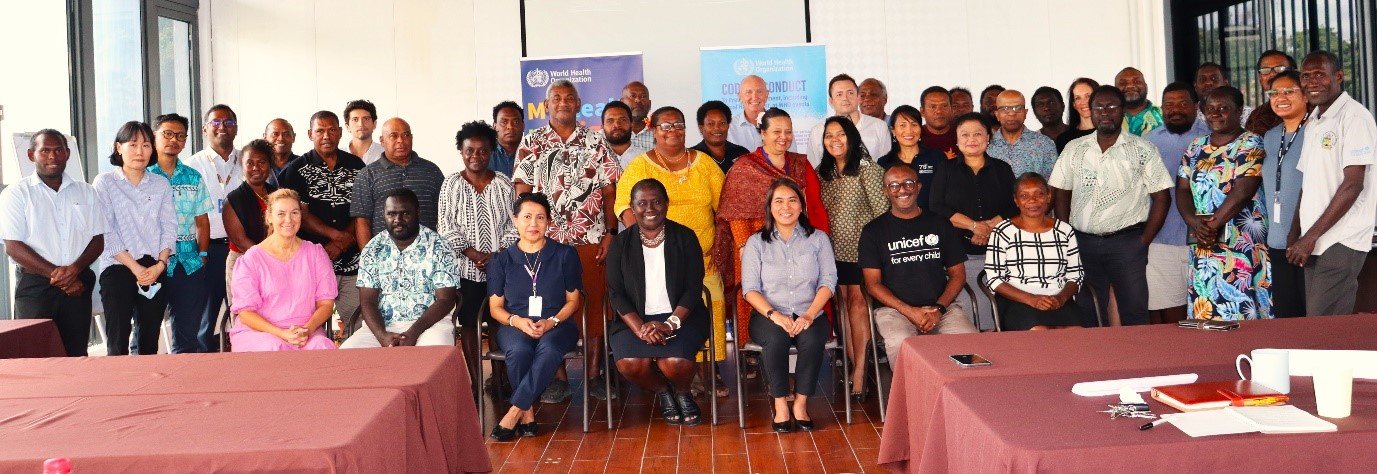
EPI one of the key pillars of Primary Health Care in the Solomon Islands
Findings of a review of the Expanded Program on Immunization (EPI) in the Solomon Islands carried out by a Joint EPI Review team has established that the program is one of the key pillars of Primary Health Care in the Solomon Islands.
The findings were presented to the Ministry of Health and Medical Services Executive team last week in Honiara.
Led by the World Health Organization, national and international experts from UNICEF, GAVI the Vaccine Alliance, National Center for Immunization Research and Surveillance (NCIRS), Department of Foreign Affairs and Trade (DFAT) Australia and World Bank conducted the EPI review in 5 provinces in Solomon Islands, focusing on all aspects of the EPI programme.
The last review on the EPI program was done 12 years ago by the same agencies and it comes at crucial phase when the Solomon Islands program is transitioning out of GAVI support by the end of 2025. The review will inform the National Immunization Strategy, to strengthen and sustain the programme beyond GAVI.
The review showed that a strong EPI programme was established in health care facilities and childhood immunization is well accepted, making it one of the key pillars of the primary health care. It also identified that dedicated staffs are available at fixed sites at all levels and vaccination is integrated with other health programmes such as Vitamin A supplementation, deworming, and growth monitoring. Also notable was the improvement of Cold chain equipment over the past few years and even more during the COVID-19 pandemic. The review also found that Solar powers to generate electricity had increased and electronic stock management tool (Open mSupply) is now in use.
Meanwhile one of the challenges identified included insufficient budget to conduct critical activities such as outreach, supportive supervision, and timely delivery of vaccines. Given that 70% of the population in Solomon Islands lives in rural areas (i.e., in remote islands, forest and mountain areas), outreach activities, which requires fuel cost and staff per diem, are important to reach the unvaccinated and under-vaccinated children.
Currently, 70% of the EPI programme is supported by GAVI which will end in Dec 2025. There is gradual shift towards domestic funding for vaccines but there are already some indications of negative impact on budgets for other medicines. These challenges affect the number and capacity of health staffs working on EPI programme and cause delay and/or cancellation of critical activities particularly outreach services.
Recommendations of the Joint Review include MHMS should continue to invest in human resource in terms of number and capacity particularly at zonal levels so as not to disrupt the immunization services and to provide safe vaccination. There is a need to improve financial management and sustainability of the EPI programme with a focus on transitioning from GAVI funding to be able to continuously conduct outreach services, supportive supervision, and timely delivery of vaccines. There is also a need to improve data quality including recording and reporting and ensuring data is used for planning, budgeting and decision making.
Speaking at the opening, MHMS Permanent Secretary Mrs Pauline McNeil acknowledged the importance of EPI.
“EPI has been one of the priority programs that SEM has been closely monitoring as we know better that a fully vaccinated infant will grow up to be a healthy child and less frequent clinic visits due to illness.
“A new study led by WHO estimates that the EPI has saved at least 154 million lives since 1974 – an average of more than 8,000 lives saved a day, for the past 50 years. Thanks to immunization, a child born today is 40% more likely to see their first birthday than a child born 50 years ago.
“This progress results from partnership – leaders, scientists, civil society, communities and families who have worked together to deliver on the dream of immunization for all. Thank you to all our partners here today.
“But vaccines don’t deliver themselves. They require a person – and not just any person, a trained personnel, require logistical support to move around, the equipment and the vaccines, the facilities, the cold chain, the planning, the data to inform Policy, plans, interventions and budget, the finances and budget. These are things that we can control,
“But there are also things that we cannot control that is beyond us – including the weather, the geographical constraints, the high rise of fuel costs, and roads to mention a few. These factors also do make access to health services and vaccination so difficult, “said PS McNeil.
Also speaking at the opening of the review presentation, WHO Coordinator Health Systems, Mrs. Monica Fong said WHO was proud to have led the review that spoke with mothers and nurses in remote parts of the country.
“WHO is proud to have led the very important joint review that will certainly inform the next steps of the program. The EPI review comprised of desk reviews of secondary data, field visits, coordination of national and international partners, consensus building, and close communication with the MHMS.
“In addition to the national and provincial level interviews with key immunization officials, staffs and partners, the reviewers visited 29 health facilities in Honiara City Council, Isabel, Malaita, Makira and Western provinces to gather information on how the immunization program is performing and what improvements may be made. Immunization nurses and mothers who came to get their babies vaccinated at these facilities were interviewed,” said the WHO Coordinator Mrs. Fong.
Ends////
– MHMS Press Release

